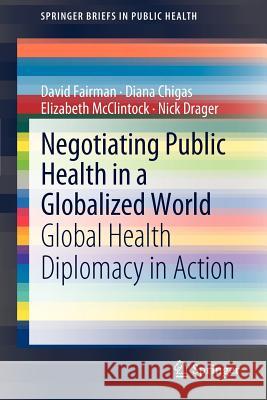Negotiating Public Health in a Globalized World: Global Health Diplomacy in Action » książka
Negotiating Public Health in a Globalized World: Global Health Diplomacy in Action
ISBN-13: 9789400727793 / Angielski / Miękka / 2012 / 186 str.
In a new era of global health diplomacy, the most important tool for decision-making is negotiation. Globalization is binding countries, issues and people together as never before. In the domain of public health, traditional international concerns like the spread of infectious diseases have been joined by new concerns and challenges in managing the health impacts of trade and intellectual property rights, and by new opportunities to create effective global public health agreements and programs. To address the major health crises of today and to prevent or mitigate them in the future, countries must seek collective agreement and action within and across their borders. However, the world of international negotiation is not the world in which health decision-makers reside or are most comfortable. The goal of this guide is to provide health policy-makers with practical information and negotiation tools, to help them create better international health agreements and programs. "This is the best book I know to help health professionals develop the negotiation skills necessary to meet the challenges of global health diplomacy. It is filled with wise advice and invaluable tools for success." Professor Jeswald W. Salacuse, The Fletcher School of Law and Diplomacy, Tufts University
In a new era of global health diplomacy, the most important tool for decision-making is negotiation. Globalization is binding countries, issues and people together as never before. In the domain of public health, traditional international concerns like the spread of infectious diseases have been joined by new concerns and challenges in managing the health impacts of trade and intellectual property rights, and by new opportunities to create effective global public health agreements and programs. To address the major health crises of today and to prevent or mitigate them in the future, countries must seek collective agreement and action within and across their borders. However, the world of international negotiation is not the world in which health decision-makers reside or are most comfortable. The goal of this guide is to provide health policy-makers with practical information and negotiation tools, to help them create better international health agreements and programs.§"This is the best book I know to help health professionals develop the negotiation skills necessary to meet the challenges of global health diplomacy. It is filled with wise advice and invaluable tools for success." Professor Jeswald W. Salacuse, The Fletcher School of Law and Diplomacy, Tufts University











